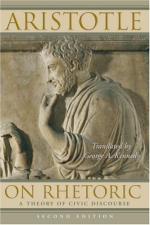
|
| Name: _________________________ | Period: ___________________ |
This quiz consists of 5 multiple choice and 5 short answer questions through Book I, Chapters 10-15.
Multiple Choice Questions
1. In what type of person did Aristotle explain there was an especially strong temptation to commit crimes?
(a) Someone that was unaware of the punishment for committing a crime.
(b) Someone that has never committed a crime.
(c) Someone that has already committed a crime and has been caught, but not convicted.
(d) Someone that has already committed a crime, but has not been caught.
2. In the beginning of the book, which one of the following did Aristotle indicate about rhetoric?
(a) It was neither an art nor a science.
(b) It was an art.
(c) It was a science.
(d) It was an art and a science.
3. How many different subjects of political oratory did Aristotle discuss in Book I, Chapter 4?
(a) Two.
(b) Five.
(c) Three.
(d) Four.
4. How many causes of human action did Aristotle detail in Book I, Chapter 10?
(a) Seven.
(b) Eight.
(c) Five.
(d) Ten.
5. How did Aristotle think rhetoric could be useful in terms of one's beliefs?
(a) Expansion.
(b) Confirmation.
(c) Explanation.
(d) Refinement.
Short Answer Questions
1. Based on the information in Book I, Chapter1, for which side(s) of a question could rhetoric allow a person to make good cases?
2. What did Aristotle think the extent of virtues was based on?
3. Which of the following did Aristotle think were more likely to commit crimes?
4. With the ethical appeal, what would the speaker be attempting to convey to the audience?
5. Why did Aristotle think the universal law was higher than the special law?
|
This section contains 297 words (approx. 1 page at 300 words per page) |

|




